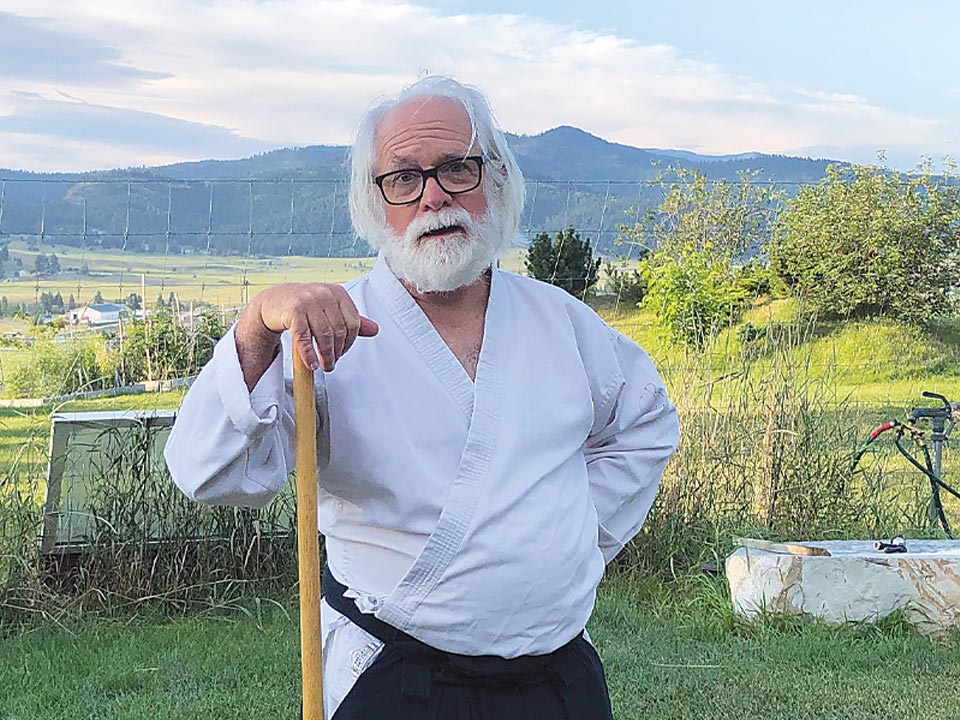For a long time, I heard a story that went something like this: Around 400 years ago, in feudal Japan, an old man was walking along a country path, minding his own business. He leaned on a wood staff for support and balance.
A young samurai passed by. The old man bowed, only slightly due to his age, to the youthful warrior, who exploded in anger. Nobody knows if he felt the bow wasn’t deep enough, or if they exchanged some words.
Whatever the reason, the samurai felt the old man did not give him the proper respect and deference. He pulled his sword and attacked.
The old man, seemingly defenseless, parried the sharp blade with his staff and proceeded to beat the living daylights out of the young man.
This, according to the story, was the only defeat of the legendary samurai swordsman, Miyamoto Musashi (1584-1645).
In my martial arts study in Aikido, especially the past few years as my hair grows increasingly silver and my joints don’t bend like they used to, I grew to know this staff, this weapon, as “the old man stick.”
I’ve loved this story and used to repeat it often. I like the idea that a simple cane can defeat a razor-sharp blade, but I also like the idea that an old person, if their thoughts are pure and their awareness keen, can defeat a younger, more robust opponent. I think many of us with a large number of candles on the birthday cake have had the feeling now and then that, “If I were a few years younger, I’d teach that young whipper-snapper a thing or three.”
There’s only one problem with this tale. It’s not true.
Stories change with time, and this tale has many variations, but most accounts go something like this.
Young Musashi was a renowned swordsman—the greatest in the history of feudal Japan. He traveled around accepting challenges for battle. Every encounter ended with him killing his opponent. His innovative style—holding a long sword in one hand and a shorter one in the other—seemed unbeatable.
After some years, with a bit of maturity, Musashi grew tired of the violence. He put away his sword and carried only a wooden replica, called a bokken, with a short stick for the other hand. He defeated many swordsmen with these wooden tools, but the battles still ended in death.
One day, Musashi encountered Musō Gonnosuke, a specialist in using a two-meter wood staff called a bo. They challenged each other and met in combat. Gonnosuke believed he could use the longer stick to defeat the swordsman.
He raised his staff high and attacked with a wicked, downward strike to Musashi’s head, who raised his weapons in a V shape and pinned the bo between them. Gonnosuke was stuck. Musashi hit Gonnosuke lightly on the forehead with the short stick, a strike far from lethal, but still memorable.
For some reason, Musashi let him live. There is no record of what the great swordsman said.
Maybe he said, “Nice try” or possibly “I admire your creativity. Nobody’s ever attacked me with just a stick before.”
Maybe he just sneered and laughed.
What we do know is the two men did not go arm-in-arm and have a beer together afterward.
Musō Gonnosuke withdrew into a Shinto monastery, where he meditated and trained. Years went by. Over time he shortened the wooden staff, so when set on the ground, it came up to his armpit—the origin of the jo. He mastered his art.
One day, he and Musashi met again.
The samurai attacked but, try as he might, was unable to strike Gonnosuke, who parried every thrust and blow with the shorter jo. The bout ended in a draw, and Gonnosuke, apparently out of respect for the great samurai who allowed him to live years earlier, returned the favor, and the two warriors parted company.
This, according to legend, is Musashi’s only defeat.
Gonnosuke went back to the monastery and taught the jo for many years, a practice known as Shintō Musō-ryū. The tradition continues today and is a major part of the style of Aikido I practice and teach.
Over my years of training, I have grown to feel the jo as an extension of my body. I hike with it. I am not a tall man, and the staff, in addition to being a hiking stick for balance, gives me comfort. Perhaps it is like the comic strip Peanuts and Linus’s pacifying blanket, but I see this simple stick as a powerful friend, an extension of myself, a companion in a potential time of need.
Should I ever be attacked by a person, a possibility I know to be unlikely, I feel prepared.
I am not, however, stupid. Being as I live in Montana, I also carry bear spray.
A stick against a charging grizzly would not be prudent and is a conflagration best left for a stream of pepper spray. MSN










